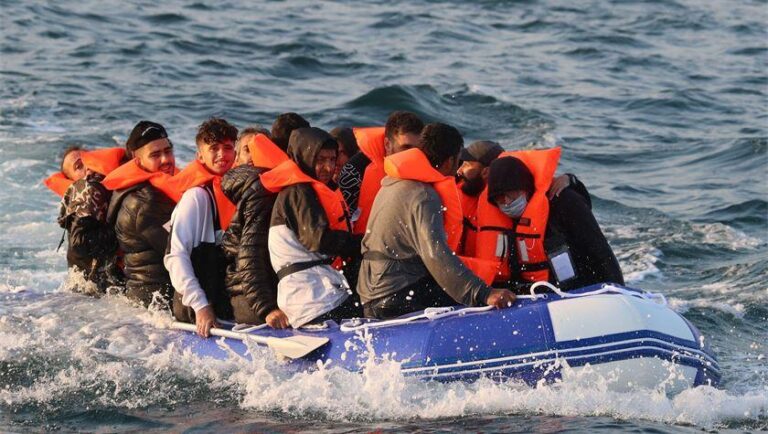Britain and France have renewed efforts to address the ongoing challenge of migrant crossings in the English Channel, officials announced Thursday. The two governments are set to implement new measures aimed at curbing the dangerous and often deadly journeys made by migrants attempting to reach the UK by small boats. This latest push comes amid rising numbers of crossings and heightened tensions over migration policy, underscoring the urgent need for coordinated action between the neighboring countries.
Britain and France Renew Efforts to Curb Migrant Crossings in the English Channel
In a renewed effort to address the ongoing crisis of unauthorized crossings in the English Channel, British and French officials convened last week to solidify cooperation and strengthen border security measures. Both governments acknowledged the complex humanitarian and security challenges presented by the steady flow of migrants attempting the perilous journey by small boats. The plan emphasizes enhanced surveillance, increased naval patrols, and improved intelligence sharing, aiming to deter attempts before they begin and intercept vessels more efficiently.
Key components of the bilateral strategy include:
- Joint maritime patrols to monitor and respond promptly to crossing attempts.
- Investment in detection technology such as drones and radar systems along critical zones.
- Stronger legal frameworks to expedite processing and return of individuals found crossing illegally.
- Support for humanitarian operations ensuring safety and proper care for migrants intercepted at sea.
| Measure | Status | Expected Outcome |
|---|---|---|
| Surveillance Expansion | In Progress | Improved detection and interception |
| Legal Reforms | Planned | Faster processing of migrants |
| Joint Patrols | Ongoing | Reduced number of successful crossings |
Key Challenges Facing Authorities in Managing Channel Migration
Authorities are grappling with a complex web of obstacles as they strive to manage the ongoing challenges of channel migration. One of the most pressing issues is the unpredictable nature of migrant flows, driven by shifting geopolitical crises and dangerous weather conditions. This volatility creates logistical strain on resources and personnel tasked with rescue operations and border security. Collaboration between British and French agencies, while essential, is frequently tested by differing legal frameworks, operational protocols, and intelligence-sharing limitations, complicating coordinated efforts to deter irregular crossings efficiently.
Operational effectiveness is further hindered by the persistent use of small, unseaworthy vessels by migrants, which demands rapid response times and specialized maritime rescue capabilities. Budget constraints, combined with the need to uphold humanitarian standards, heighten the dilemma authorities face — balancing stringent security with life-saving interventions. Below is a concise overview of key challenges faced by border agencies:
| Challenges | Impact on Operations |
|---|---|
| Unpredictable Migration Patterns | Strains resource allocation and readiness |
| Legal and Jurisdictional Differences | Hinders seamless bilateral coordination |
| Use of Unsafe Vessels | Raises urgency and complexity of rescues |
| Budgetary Constraints | Limits long-term investment in infrastructure |
| Humanitarian Obligations | Requires sensitive handling during interceptions |
- Communication barriers affecting real-time intelligence sharing;
- Pressure from political landscapes influencing enforcement intensity;
- Environmental conditions posing ongoing risks to migrants and responders alike.
Collaborative Strategies Proposed to Enhance Border Security and Humanitarian Support
Authorities from both Britain and France have emphasized the importance of joint operations to effectively manage the persistent challenge of migrant crossings through the English Channel. Key measures include enhanced surveillance using cutting-edge technology such as drones and radar systems, as well as increased patrols by maritime units on both sides of the channel. Collaborative intelligence sharing via a dedicated bilateral task force aims to disrupt the networks of human traffickers who exploit the route. Additionally, cross-border communication protocols are being refined to ensure rapid response capabilities during critical incidents, significantly reducing dangers for both migrants and enforcement personnel.
Alongside security efforts, humanitarian considerations remain pivotal in the strategy. France and the UK are working towards establishing streamlined reception and support centers designed to offer immediate medical care, counseling, and legal assistance for intercepted migrants. The plan also includes installing multilingual information points at key transit locations to communicate rights and available services clearly. Below is a summary of the proposed initiatives aimed at balancing security concerns with compassionate support:
- Integrated Patrols: Coordinated sea and air surveillance between both countries
- Task Force Intelligence: Real-time sharing on smuggling routes and vessel movements
- Rapid Response Units: Joint emergency teams for migrant rescue operations
- Humanitarian Reception Centers: Providing health checks and legal aid swiftly
- Multilingual Outreach: Informational campaigns catering to diverse migrant populations
Recommendations for Sustainable Solutions to Prevent Dangerous Crossings
To effectively reduce the perilous attempts by migrants crossing the English Channel, collaborative efforts must emphasize long-term, humane, and practical measures. One vital approach involves enhancing legal pathways for asylum seekers, thus diminishing the need for dangerous journeys. Governments should invest in robust border cooperation frameworks and intelligence sharing, ensuring swift identification and support for vulnerable individuals while disrupting criminal smuggling networks. Furthermore, community engagement in both Britain and France can foster awareness and create grassroots support systems, helping migrants understand their rights and available legal options.
Implementing innovative technology, such as advanced monitoring systems and real-time communication networks, can also help authorities respond more promptly to risky crossings. Here’s a summary of key sustainable solutions:
- Expand legal asylum channels to reduce irregular attempts
- Strengthen cross-border intelligence and coordination
- Enhance search and rescue operations ensuring safety at sea
- Increase public awareness campaigns in migrant communities
- Target smuggling operations with cutting-edge technology
| Solution | Expected Impact | Implementation Priority |
|---|---|---|
| Legal asylum expansion | Decrease risky crossings | High |
| Intelligence sharing | Disrupt smuggling rings | Medium |
| Rescue operation funding | Reduce fatalities | High |
| Awareness campaigns | Informed migrant decisions | Medium |
Future Outlook
As Britain and France renew efforts to stem the flow of migrants crossing the English Channel, the challenge remains complex and multifaceted. Authorities on both sides continue to balance humanitarian concerns with border security, seeking solutions that address the root causes of migration while ensuring the safety of all involved. With tensions periodically flaring and the unpredictable nature of the Channel crossing, the ongoing cooperation between the two nations will be crucial in managing this persistent and deeply sensitive issue. ABC News will continue to monitor developments as they unfold.




